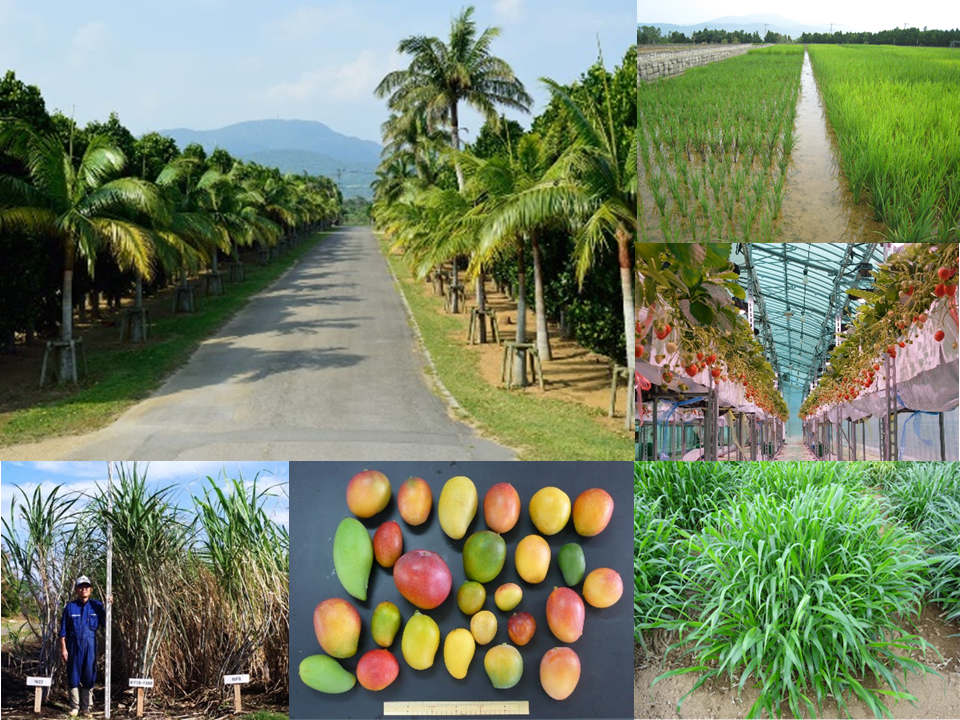Pick Up
809. TARF at the Forefront of Japan’s Tropical Agriculture Research

809. TARF at the Forefront of Japan’s Tropical Agriculture Research
June 29th is the United Nations International Day of the Tropics. Global warming is causing rising temperatures, typhoons and torrential rains, and rising sea levels in many parts of Japan, phenomena that are thought to be part of the tropicalization process. In agriculture, poor fruit coloring and high temperature damage to rice, tomatoes, and other crops have become common. The Tropical Agriculture Research Front, or TARF for short, works daily to solve global food and environmental problems, including climate change, by taking advantage of the climatic and geographic conditions of subtropical humid Ishigaki Island.
Under the 5th Medium- to Long-Term Plan, which began in FY2021, JIRCAS has established three research programs (Environment, Food, and Information) and 17 research projects to contribute to the development of sustainable agriculture, forestry, and fisheries by improving agriculture, forestry, and fisheries technologies in Japan and the world. Among these, TARF mainly conducts and participates in research projects on "Tropical crop genetic resources", "Yama-Sato-Umi agroecosystem connectivity" and "Research application/ventures".
The Tropical crop genetic resources project utilizes the genetic resources of sugarcane, indica rice, tropical fruit trees and Brachiaria (tropical pasture grass) maintained at TARF to provide and share information and promote collaboration through the evaluation of genetic resources and the development of new breeding materials for stable production in poor environments. As a result, this fiscal year we launched the JIRCAS-Erianthus Database, which provides information on the morphological and agronomic characteristics of Erianthus (related genus of sugarcane) germplasm in Thailand, and the JIRCAS Mango Genetic Resources Site (English version), which provides information on mango cultivars from around the world to researchers, producers, and consumers.
The Yama-Sato-Umi agroecosystem connectivity project is developing technologies to reduce soil and nutrient runoff in mountains, villages, and oceans, with the goal of demonstrating the technologies and quantifying the effects of their introduction at TARF and implementing them in society throughout Okinawa Prefecture, including Ishigaki Island, and in the Philippines, another tropical island nation. As a result, we developed technology to accurately predict nutrient concentrations in major rivers on Ishigaki Island using machine learning. The project also produced a device for observing the dynamics of nitrogen and other nutrients in soil, which was awarded the "Commendation for Science and Technology by the Minister of Education, Culture, Sports, Science and Technology" on April 7, 2023.
In the Research applications/ventures project, we are working to develop a plant factory for the stable production of high-quality vegetables throughout the year, even in tropical and subtropical regions. This research, conducted in collaboration with private companies and the National Agriculture and Food Research Organization (NARO), focuses on environmental control systems and crop management methods in greenhouses for tomatoes and strawberries. The results of this research have attracted much interest from the Asia-Monsoon region, with representatives from countries in Southeast Asia, the Middle East and other regions visiting the TARF Plant Factory facilities.
References
JIRCAS-Erianthus Database
https://www.jircas.go.jp/ja/database/erianthus
JIRCAS Mango Genetic Resources Site
https://www.jircas.go.jp/en/database/mango/mango-top
Machine Learning Predicts Nutrient Concentrations in Tropical Rivers (Press Release)
https://www.jircas.go.jp/en/release/2023/press202302
Three TARF Staff Members Receive the MEXT Award for Creativity
https://www.jircas.go.jp/en/reports/2023/r20230517
Delegation from the Embassy of the Republic of Singapore in Japan Visits Plant Factory
https://www.jircas.go.jp/en/reports/2022/r20230217_0
Contributors: OMAE Hide, YAMANAKA Shinsuke, ANZAI Toshihiko and NAKAYAMA Masakazu (TARF)
